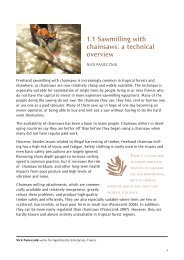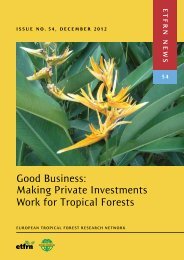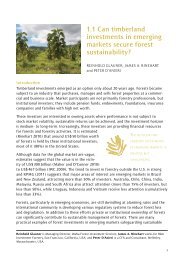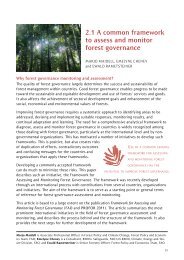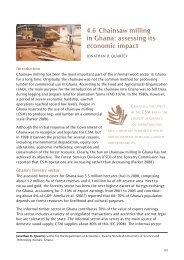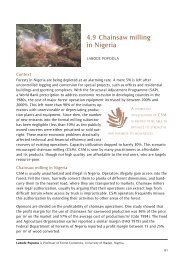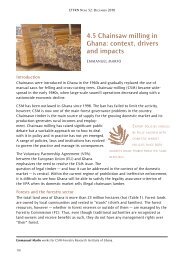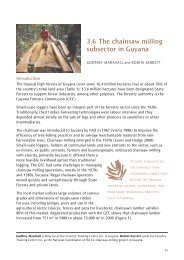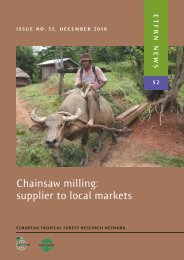Chainsaw milling: supplier to local markets - European Tropical ...
Chainsaw milling: supplier to local markets - European Tropical ...
Chainsaw milling: supplier to local markets - European Tropical ...
Create successful ePaper yourself
Turn your PDF publications into a flip-book with our unique Google optimized e-Paper software.
130<br />
ETFRN NEws 52: DEcEmbER 2010<br />
The informal sec<strong>to</strong>r is omnipresent in sudano-sahelian trade. it can be seen as a tertiary<br />
refuge sec<strong>to</strong>r, 3 stimulated by ongoing urban development (mcGee 1979; portes, Castells<br />
and ben<strong>to</strong>n 1991; san<strong>to</strong>s 1979).<br />
one of the main features of<br />
inter-african trade networks of<br />
the sudano-sahelian regions is<br />
their strong ethnic component.<br />
networks are based on ethnic<br />
identity and provide a social<br />
structure and informal institution.<br />
They exist in the context<br />
of weak formal institutions,<br />
incompetent administrations<br />
and rampant corruption. These<br />
ethnic networks can secure trade<br />
relationships with the trust necessary<br />
<strong>to</strong> organize trans-national<br />
economic exchanges. David<br />
(1999), for example, has studied<br />
the onion trade from niger<br />
through burkina Faso <strong>to</strong> ivory<br />
Coast. The haoussa ethnic network<br />
constitutes of a secure yet<br />
informal international institution<br />
for dispute settlement, financial<br />
support, information sharing and<br />
trade facilitation (David 1999).<br />
Figure 1. Map of cameroon<br />
in the case of inter-african trade<br />
of wood products (timber or firewood), harvesting is essentially informal. There are many<br />
supply chains, relatively easy <strong>to</strong> identify with the appropriate methods, each answering<br />
<strong>to</strong> specific demand, transportation, production system, resource and functions (bertrand<br />
1989). in Cameroon, people equipped with chainsaws or mobile saws operate clandestinely<br />
in agro-forest zones, forest reserves and even Forest management units (Fmus). although<br />
these activities became illegal in 1999 after a ban imposed by the Forest Department of<br />
the Environment (minEF 2003), they did not end.<br />
Methodology<br />
The Forest product networks methodology for surveys was used. 4 it consists of semi-directed<br />
interviews, collection of data on forest products and trade, and in situ observations<br />
and measurements. in this case study, the trade chain was limited <strong>to</strong> the timber flow from<br />
Cameroon <strong>to</strong> Chad over the kousséry-ndjamena bridge (Figure 2). some time was spent<br />
studying the main timber and furniture <strong>markets</strong> of Yaoundé. 5



